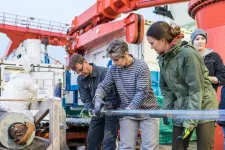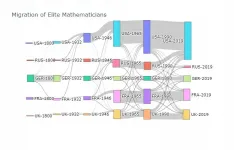(Press-News.org) Gas hydrates are a solid compound of gases and water that have an ice-like structure at low temperatures and high pressures. Compounds of methane and water, so-called methane hydrates, are found especially at many ocean margins - also in the Black Sea. In addition to a possible use as an energy source, methane hydrate deposits are being investigated for their stability, as they can dissolve with changes in temperature and pressure. In addition to releases of methane, this can also have an impact on submarine slope stability.
During a six-week expedition with the German research vessel METEOR in autumn 2017, a team from MARUM and GEOMAR investigated a methane hydrate deposit in the deep-sea fan of the Danube in the western Black Sea. During the cruise, which was part of the joint project SUGAR III "Submarine Gas Hydrate Resources" jointly funded by the BMWi and BMBF, the gas hydrate deposits were drilled using the mobile seafloor drilling device MARUM-MeBo200. The results of the investigations, which have now been published in the international journal Earth and Planetary Science Letters, have provided the scientists with new insights into changes in the stability of gas hydrates.
"Based on data from previous expeditions, we selected two working areas where, on the one hand, methane hydrate and free methane gas coexist in the upper 50 to 150 metres of the hydrate stability zone and, on the other hand, a landslide and gas seeps were found directly at the edge of the gas hydrate stability zone", explains Prof. Dr. Gerhard Bohrmann, expedition leader from MARUM and co-author of the study. "For our investigations we used our drilling device MARUM-MeBo200 and broke all previous depth records with a maximum depth reached of almost 145 metres".
In addition to obtaining samples, the scientists were, for the first time, also able to carry out detailed in situ temperature measurements down to the base of the gas hydrate stability under the seabed. Previously, this baseline was determined using seismic methods, from which the so-called "bottom simulating reflector" (BSR) was obtained as an indicator of this base. "However, our work has now proven for the first time that the approach using the BSR does not work for the Black Sea", explains Dr. Michael Riedel from GEOMAR, lead author of the study. "From our point of view, the gas-hydrate stability boundary has already approached the warmer conditions in the subsurface, but the free methane gas, which is always found at this lower edge, has not yet managed to rise with it", Riedel continues. The reasons for this could be attributed to the low permeability of the sediments, which means the methane gas is still "stuck" down there and can only rise very, very slowly under its own power, according to the scientist.
"However, our new analyses of the seismic data have also shown that in a few places the methane gas can break through the BSR. There, a new BSR is just establishing itself over the 'old' reflector. This is new and has never been seen before", says Dr Matthias Haeckel, co-author of the study from GEOMAR. "Our interpretation is that the gas can rise in these places, as disturbances in the seabed here favour the flow of gas", Haeckel continues.
"In summary, we have found a very dynamic situation in this region, which also appears to be related with the development of the Black Sea since the last ice age", says Michael Riedel. After the last glacial maximum (LGM), the sea level rose (pressure increase), and when the global sea level rose above the threshold of the Bosporus, salty water from the Mediterranean Sea was able to propagate into the Black Sea. Before that, this ocean basin was basically a freshwater lake. In addition, global warming since the LGM has caused a temperature rise of the bottom water in the Black Sea. The combination of these three factors - salinity, pressure and temperature - had drastic effects on the methane hydrates, which decompose as a result of these effects. The current study exemplifies the complex feedbacks and time scales that induce climate changes in the marine environment and is therefore well suited to estimate the expected consequences of today's more rapid global warming - especially on the Arctic gas hydrate deposits.
Cruise leader Gerhard Bohrmann summarizes: "At the end of the SUGAR-3 programme, the drilling campaign with MeBo200 in the Black Sea showed us once again very clearly how quickly the methane hydrate stability in the ocean deposits also changes with environmental fluctuations".
INFORMATION:
Reference:
Riedel, M., T. Freudenthal, J. Bialas, C. Papenberg, M. Haeckel, M. Bergenthal, T. Pape, and G. Bohrmann, 2021: In-situ borehole temperature measurements confirm dynamics of the gas hydrate stability zone at the upper Danube deep sea fan, Black Sea. Earth and Planetary Sci. Lett., https://doi.org/10.1016/j.epsl.2021.116869.
Links:
http://www.gashydrat.de Gas hydrate research at MARUM
https://www.sugar-projekt.de/sugar SUGAR Project
Most businesses were ill-prepared to deal with the pandemic and muddled though the challenges stemming from it, according to a report published today.
Resilience reimagined: a practical guide for organisations was produced by Cranfield University, in partnership with the National Preparedness Commission (NPC) and Deloitte. The report presents insights from business leaders from a range of sectors and makes seven recommendations for organisations on how to become more resilient, drawing on lessons from past 12 months.
Cranfield University's Professor David Denyer and Mike Sutliff conducted in-depth interviews and four focus groups with more than 50 C-suite level people (boards, senior executives, policymakers, and resilience directors) from FTSE 100 companies, ...
As social media platforms like Instagram, Snapchat, TikTok and others continue to grow in popularity, adolescents are spending more of their time online navigating a complex virtual world.
New research suggests that these increased hours spent online may be associated with cyberbullying behaviors. According to a study by the University of Georgia, higher social media addiction scores, more hours spent online, and identifying as male significantly predicted cyberbullying perpetration in adolescents.
"There are some people who engage in cyberbullying online because of the anonymity and the fact that there's no retaliation," said Amanda Giordano, principal investigator of the study and associate professor in the UGA Mary Frances Early College of Education. "You have these ...
Math's top prize, the Fields Medal, has succeeded in making mathematics more inclusive but still rewards elitism, according to a Dartmouth study.
Published in Nature's END ...
Researchers at the Johns Hopkins Kimmel Cancer Center used machine learning techniques to detect mutational signatures in cancer patients. Their algorithm outperformed the current standard of analysis and revealed new mutational signatures associated with obesity, which is believed by cancer prevention experts to be becoming the most significant lifestyle factor contributing to cancer in the U.S. and most of the Western world.
The study was published in the Jan. 25 issue of the journal eLife.
"Mutational signatures are important in current cancer research as they enable you to see the signs left by underlying factors, such as aging, smoking, alcohol use, UV exposure, and BRCA inherited mutations that contribute to the development ...
Making people fear the coronavirus may motivate us to wash our hands, keep our distance and wear a face mask. But fear also takes a heavy toll on our mental health and is fertile ground for discrimination and prejudice. New research shows a different path.
When the coronavirus pandemic hit the world in the spring of 2020, feelings of being capable or efficacious against the virus were a key factor in driving compliance with the authorities' guidelines. This is the result of a new study based on large surveys across eight Western democracies, published in British Journal of Health Psychology.
The extent to which we personally felt informed and capable of acting clearly affected the extent of our behaviour to prevent infection, e.g. by keeping our distance ...
A team of researchers at the Technical University of Munich (TUM) has developed a new early warning system for vehicles that uses artificial intelligence to learn from thousands of real traffic situations. A study of the system was carried out in cooperation with the BMW Group. The results show that, if used in today's self-driving vehicles, it can warn seven seconds in advance against potentially critical situations that the cars cannot handle alone - with over 85% accuracy.
To make self-driving cars safe in the future, development efforts often rely on sophisticated models aimed at giving cars the ability to analyze the behavior of all traffic participants. But what happens if the models are not yet capable of handling some complex ...
Drinking beetroot juice promotes a mix of mouth bacteria associated with healthier blood vessels and brain function, according to a new study of people aged 70-80.
Beetroot - and other foods including lettuce, spinach and celery - are rich in inorganic nitrate, and many oral bacteria play a role in turning nitrate to nitric oxide, which helps to regulate blood vessels and neurotransmission (chemical messages in the brain).
Older people tend to have lower nitric oxide production, and this is associated with poorer vascular (blood vessel) and cognitive (brain) health.
In the new study, by the University of Exeter, 26 healthy older people took part in two ten-day supplementation periods: one with nitrate-rich ...
Increasing numbers of people in Belgium are turning away from meat in favour of plant-based alternatives, according to new research from psychologists at the University of Bath, in collaboration with Belgian animal welfare organisation GAIA.
New analysis finds that in 2020, over half of Belgians (51%) were 'satisfied' with meat alternatives - a figure that has increased from 44% since 2019.
The results of the research which gauged responses from a representative sample of 1,000 people in Belgium over two years (in 2019 and 2020) highlights concerns around animal agriculture and the environment that are impacting individuals' dietary choices.
Additional findings from ...
Computer scientists at the University of Surrey have created a ground-breaking model that could improve our understanding of developmental disorders such as autism.
Scientists have long tried to better understand how the cerebral cortex and its layers develop, with pathologies such as autism, schizophrenia and epilepsy linked to this process.
In a paper published by the journal Cerebral Cortex, scientists from Surrey, Newcastle University, and Nottingham University detail how they developed and used a computational model to simulate cell division, cell migration and apoptosis (cell death) in the hope of understanding how these processes affect the development of the brain.
With the help of their computer model, the ...
A study examining bean productivity among smallholder farmers in Tanzania, has found that on average, yields are 6% lower among female than male farmers. Women are often 'invisible' in agriculture, researchers say, due to social structural barriers and national agricultural policies, which do not address discriminatory land rights; education and agricultural information and decision making, which must be tackled to reverse this trend.
The paper 'What Does Gender Yield Gap Tell Us about Smallholder Farming in Developing Countries?' published in the open access scientific journal Multidisciplinary Digital Publishing (MDPI), analyzed data from southern region in Tanzania since 2016 and also drew on research ...



